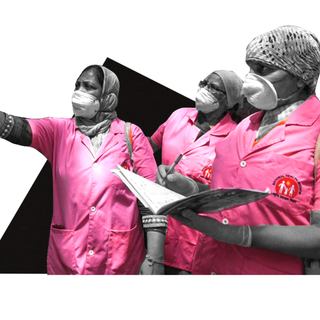The Gauhati High Court last week directed a civic body in Assam’s Cachar district to provide free ration to sex workers, who have lost their source of livelihood during the pandemic and been pushed into poverty.
The order pertains to sex workers and their families living in Panpatty, a “red light area” in Assam. Delivered by Assam’s Chief Justice Sudhanshu Dhulia and Justice M.R. Pathak, the judgment was prompted by public interest litigation filed before the court by Debajit Gupta, a local activist. He pleaded before the court that sex workers were on the “verge of starvation” since they didn’t have access to any relief funds from the government.
Acknowledging the urgency of the petition, the court ordered groceries and food to be provided to the workers on the same day.
Gupta told The Wire that sex workers’ loss of income has had a cascading effect on their families — impacting access to healthcare during a pandemic, education for their children, and their ability to pay for shelter.
“The sex workers and their families are deprived of basic dignity. Stigmatization from society has rendered them more marginalized than ever before… The Covid19 pandemic has already added to their woes but what was unfortunate [is] that the state government has no plans in place to give them any relief,” Gupta says, calling it “a violation of their fundamental right to live with dignity, health, and other basic rights.”
Related on The Swaddle:
Work, Re‑cultured: A Sex Worker Trying to Standardize Pandemic Safe Sex Protocols
In September last year, the Supreme Court — after being approached by the Durbar Mahila Samanway Committee, the country’s oldest collective of sex workers — directed all states and union territories to provide dry rations to sex workers identified by the National AIDS Control Organization, and other district authorities.
“Sex workers move frequently to avoid identification by family or for better-earning opportunities. This makes it doubly difficult to provide relief work through government channels that ask for ration cards and other identity and address proof,” activists working closely with sex workers in India wrote in EPW. In order to address the lack of government-issued IDs that block access to relief packages, the Supreme Court stated that sex workers should be given aid without insisting on proof of their identities.
Even though several months have passed since the judgment, the present case suggests that not all sex workers have been able to avail government aid. “Given the stigma and social prejudice against sex workers even the welfare and the charity systems are failing,” Tripti Tandon, lawyer and Deputy Director of the Lawyers’ Collective, a Bangalore-based human rights organization, had told Firstpost in October. Last year, the Joint United Nations Programme on HIV and AIDS had released a report on the hardship and discrimination faced by sex workers globally during the pandemic — appealing to countries to protect their human rights.
While the decision of the Gauhati HC is certainly a step in the right direction, there’s much still to be done. “With the end of the pandemic nowhere in sight, their livelihoods based on physical contact are in peril… Unlike other professions where social distancing and sanitization is enough to reopen offices, it will be more than just a while before sex workers can return to work,” the Press Trust of India (PTI) reported in October last year.
While ration can serve as a source of immediate relief, many sex workers are unsure of when they’ll be able to earn a livelihood again. “Maybe the government can provide skill development programs for us so we can have an alternative livelihood,” a 34-year-old sex worker from Warangal, Telengana told PTI. “I have lost complete hope of being able to return to work anytime soon.”




